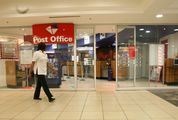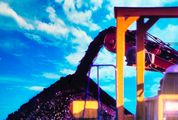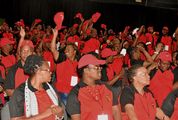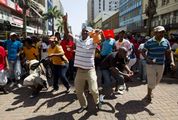GEOFF Jennett, CEO of Emira, talks about the property fund’s half-year results.
BUSINESS DAY TV: Emira Property Fund is maintaining its track record with focused leasing in the office sector and emphasis of retaining tenants and disposing of noncore properties. It’s announced 8.8% growth in distributions per share for its half year to December 2015. Geoff Jennett, CEO of Emira Property Fund joins us now in the News Leader studio.
Geoff...so you’ve delivered to market guidance that you’ve offered and at the top of your release you highlight your vacancy rate now standing at 4.7% and an especially high tenant retention of 82%. How much tougher a market is it becoming to actually keep a handle on that?
GEOFF JENNETT: It’s definitely a little bit tougher out there, but we’ve got a good team, we’ve got a good leasing team that’s out there talking to our tenants and so we’ve been very pleased to take our vacancy rate down from 5.1% to 4.9% to now 4.7%. We see that, going forward, stabilising at or around the 5% level...without doubt its is tougher, but it’s important to stay close to your tenants and because of that, I believe that’s where we’ve had good success.
BDTV: How much have you had to compromise, such as on the rental fee you fetch, for example, or are you sufficiently pushing through your contractual escalations?
GJ: Fortunately we can push through our contractual escalations. If I look at our reversion rates in terms of our rental rates back to market and so on, we’re pretty much level...in fact we’re negative 0.1%. But as I say because we stay close to our tenants, because we’ve got a low vacancy rate, it’s not something that we have to give up too easily.
The other important part is that on the retention side...our tenant retention is now sitting at just over 82% and that’s a high retention ratio and I believe that’s because we stay so close to our tenants and that will continue for the near future.
BDTV: So let’s hone in on the conversations you’re having with tenants right now — what are they after at the end of the day, within the current economic environment?
GJ: Tenants are without doubt after good-quality space and happy to retain their space to continue leasing from us in the three-to-five-year area. They definitely do have stresses from their side, but as a landlord of 146 properties, we know what we’re doing and we stay close to our tenants. And it’s because of that that our tenants stay with us, and the conversations around the tenants and so on has to do with the economy.
And the economy in terms of certain sectors has been tough. We expect it to get a bit tougher, but we have a quality portfolio. We have longer-term leases and so with that in mind we are confident that we will be able to continue to deliver similar retention and vacancy rates going forward.
BDTV: Of course your core portfolio sees you spanning industrial, office space and retail as well. Are there any discerning trends that stand out more so in one sector as opposed to another?
GJ: Overall the office market is probably a bit more under stress than what it is in retail. At the moment on the retail side there is still some stress to come through because of the high interest rates and the lower personal consumption expenditure coming through.
From the industrial side again there’s stress there because on the manufacturing side we’re not a manufacturing nation, but having said that if I look at Emira and I look at our portfolio in that, we’re well positioned. We stay close to our tenants and because we focus on the nodes that we know and like, we haven’t been overly exposed on that side. So I believe we’re quietly confident that we should be able to continue the growth rates that we’re seeing.
BDTV: Portfolio additions that you’ve made over the period...you’ve acquired properties to the value of R240m. redevelopments have been in focus as well. Is your exposure still going to be primarily across these traditional property sectors and what’s your sense of the demand you’re catering to right now?
GJ: We definitely see our exposure increasing across the spectrum. We see ourselves as a balanced and diversified fund so we’re pretty much evenly split between office and retail and then a smaller proposition within industrial. We see us continuing that.
If I look at our development pipeline, we’ve got a particularly exciting development pipeline, which just over R515m of which our flagship is our new Knightsbridge development...I’m happy to talk about that in more detail. But that’s Emira reinvesting into its portfolio and its coming out of those reinvestments.
Our acquisitions...we have only acquired R244m, which includes our new Summit Place development in Menlyn, Pretoria, which is a fantastic node that we know and like. It’s just off the N1 highway at Gaarsfontein next to Menlyn Shopping Centre. A great node there with good visibility. So from time to time, these pockets of excellence come up and that’s where we’re looking to redevelop.
BDTV: You’re also always on the search for new opportunities within the market and when it comes to what you’re targeting right now, very interestingly, I picked up that you’re considering nontraditional sectors, which could include the residential property.
So how cautious do you have to be in venturing into that space right now, because some would question the timing given the interest-rate cycle that we’re in, given the fact that we’re anticipating further tax hikes, and all within a very distressed economy that’s looking to more job losses potentially down the line?
GJ: Emira has no exposure at this point in time to the residential market but we do believe that on the long-term side, that could play an important role in our overall role in our overall balance in diversified portfolio. So to that end we plan to invest between R70m-R100m into the residential market with co-owners and people that know how to manage residential.
And coming from that we will then be in a proper position a year or so from now when we could then reinvest further. We have one or two sites, office sites that perhaps the best use would be for residential. That could be much larger than R100m and so with that in mind, we’re starting to dip our toes in the residential side. Its early days from a residential...I appreciate what you’re saying in terms of higher interest rates, but again Emira’s approach is always a cautious one but we need to know what we are doing and then we will invest fully.
BDTV: Okay, so let’s look at what you’re doing in Australia because Growthpoint Properties Australia supporting your distribution growth. You’ve seen income from that investment increasing by 21.8%...to what extent has the exchange rate prompted what you’ve seen in terms of performance on that end and what kind of traction are you making?
GJ: On our investment into Growthpoint Australia we reported a 21% increase in distributions. I would say that about 80%-85% of that is the currency depreciation that’s happened, which has only really happened in the last three months with a 3.5% underlying growth in distribution per share. We like what Growthpoint Australia has done for us. It now constitutes 7% of our total assets on an offshore side and we plan to follow a similar model where we invest into offshore REITs in slow and small amounts in terms of 1%, 2% or 3% and that would take that 7% up to the 10% level over the next 12-18 months.
But again we will be selective in terms of the jurisdictions we will invest into. We don’t see ourselves investing directly into foreign jurisdictions until we know and understand that jurisdiction and the properties that are in there. And our Growthpoint stake is a good example of how we’ve done this. We’ve invested into a listed entity to begin with, now we’re in a position if we decided, to invest directly into Australia, directly into property with co-owners.
But I believe that’s the path that we will be taking, taking our 7% up to 10% cautiously but knowing that we want to increase our offshore exposure.




















Login OR Join up TO COMMENT